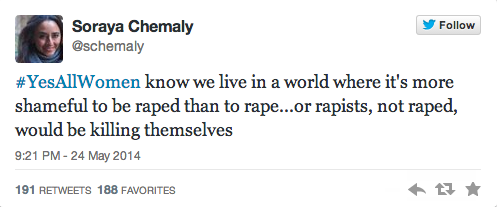
YesAllWomen Isn't Against All Men
Written by Elaine Wilson, Posted on
In the last few days, social media has exploded with the hashtags, #NotAllMen and its opposite, #YesAllWomen. As many know, the hashtag storm resulted from the horrific shootings in Isla Vista, California, where Elliot Rodger killed six women because of his perceived “rejection” by the entire female sex. While #NotAllMen stemmed from a knee-jerk defense that often happens with a mass criticism of misogyny, #YesAllWomen, in turn, resulted from the insistence that yes, not all men treat women badly—but that yes, all women have been treated badly by men.
And no doubt that men have received crap from women, and so have women, and so have children, and dogs and cats and . . . wow. We could go on. It’s a perpetual circle of the human race, and every single one of us has been treated terribly by someone. But today, let’s focus on sexism—the sexism that still exists in the 21st century.
Because despite my detailed reports to police and even his spiritual leaders, my rapist is still living free from consequences.
Because my ex-boyfriend, who was always so certain of his charm with women, kissed me when I told him no—and when I was with someone else.
Because in an intimate moment with someone, they surprised me by inflicting great pain on me—they thought it was a turn on, and smiled at my shriek.
Because I was told by my own father that women don’t need to go to school to raise children.
Because my 13-year-old daughter thought it was perfectly acceptable and accurate to refer to her fellow classmate as a “slut,” even though she had never heard her mother do such a thing.
Because even at thirty-five, I am told I’m dressing like a whore if I wear anything that accentuates my breasts.
Because no matter how many times I said, “No,” a married man I knew would text me every couple of months to see if I would “be dirty” with him.
Because I was told that if women in America would realize how poorly women were being treated in other countries, we wouldn’t be so insistent that we deserve more here.
And yes, I get it.
“Not all men would think hurting you is fun.” I know, I’m marrying one.
“Not all men would dismiss your education.” I know, I’m employed by one.
“Not all men think that you shouldn’t fight for equal rights.” I know, I was taught in school by one.
But why do my statements and millions of others' have to be interjected with a “not all men,” or “not every guy,” as if the validity of my statements must be called into question because some people give sweeping generalizations? Why am I being reminded of the goodness of so many men when I am only pointing the finger at one?
Continuing the Conversation
This dialogue is not meant to silence the voices of countless others who have been hurt—boys and men. This is meant to be constructive, to bring attention to the problem that, in 2014, we still have blatant sexism and entitlement that leads young men (disturbed or not) to think that they have the right to take what they want. This discussion isn’t about the men who aren’t the problem—but about those who are, those who have been, and the culture that breeds the men into “those that will be.”
It’s not an easy subject, which is perhaps why it has gone on way too damn long. And the defensive cries of, “Well it wasn’t me!” fail to address the very real and disturbing problem of, “Well, it was him—and him and him and him.” This is now. We could be on the edge of something so great, a revolutionary outlook so stunning, that it could change culture as it stands. And yet, the conversation seems to keep getting pulled back by the admonitions to be fair to “all men,” by the insults and threats that have already happened against the women who say what some didn’t want to hear.
#YesAllWomen could be a very important key to helping both men and women alike have a greater understanding to exactly what our culture is constantly telling all of us. It could also change the expectations towards young boys who are told to “be a man,” and then are left to observe all the others and find out just exactly what that is. We’ve come a long way, and need to come so much farther. Those who are objecting to the misogynistic focus should be able to understand this. Yet they are balking at the “YesAllWomen” subject.
So fine. Let’s switch it around for them.
#NoAllWomen do not hate all men.
#NoAllWomen do not feel safe in their own neighborhoods and homes.
#NoAllWomen do not get the same educational and career opportunities at every place.
#NoAllWomen do not owe anyone else anything of their bodies or their emotions.
#NoAllWomen are not being overly dramatic with sharing their stories and tacking on a hash tag that you don’t like.
#NoAllWomen do not need to just “deal” or take more precautions.
And #NoAllWomen have not seen justice served for what has happened to them. But sharing their—our story—is a positive huge step.
The #YesAllWomen conversation needs to continue. The time is now—it can be now, it needs to be now. Martin Luther King said, “In the end, we will remember not the words of our enemies, but the silence of our friends.” In America, the silence has gone on for far too long.
